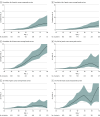Germline CDH1 Variants and Lifetime Cancer Risk
- PMID: 38873722
- PMCID: PMC11372503
- DOI: 10.1001/jama.2024.10852
Germline CDH1 Variants and Lifetime Cancer Risk
Abstract
Importance: Approximately 1% to 3% of gastric cancers and 5% of lobular breast cancers are hereditary. Loss of function CDH1 gene variants are the most common gene variants associated with hereditary diffuse gastric cancer and lobular breast cancer. Previously, the lifetime risk of gastric cancer was estimated to be approximately 25% to 83% and for breast cancer it was estimated to be approximately 39% to 55% in individuals with loss of function CDH1 gene variants.
Objective: To describe gastric and breast cancer risk estimates for individuals with CDH1 variants.
Design, setting, and participants: Multicenter, retrospective cohort and modeling study of 213 families from North America with a CDH1 pathogenic or likely pathogenic (P/LP) variant in 1 or more family members conducted between January 2021 and August 2022.
Main outcomes and measures: Hazard ratios (HRs), defined as risk in variant carriers relative to noncarriers, were estimated for each cancer type and used to calculate cumulative risks and risks per decade of life up to age 80 years.
Results: A total of 7323 individuals from 213 families were studied, including 883 with a CDH1 P/LP variant (median proband age, 53 years [IQR, 42-62]; 4% Asian; 4% Hispanic; 85% non-Hispanic White; 50% female). In individuals with a CDH1 P/LP variant, the prevalence of gastric cancer was 13.9% (123/883) and the prevalence of breast cancer among female carriers was 26.3% (144/547). The estimated HR for advanced gastric cancer was 33.5 (95% CI, 9.8-112) at age 30 years and 3.5 (95% CI, 0.4-30.3) at age 70 years. The lifetime cumulative risk of advanced gastric cancer in male and female carriers was 10.3% (95% CI, 6%-23.6%) and 6.5% (95% CI, 3.8%-15.1%), respectively. Gastric cancer risk estimates based on family history indicated that a carrier with 3 affected first-degree relatives had a penetrance of approximately 38% (95% CI, 25%-64%). The HR for breast cancer among female carriers was 5.7 (95% CI, 2.5-13.2) at age 30 years and 3.9 (95% CI, 1.1-13.7) at age 70 years. The lifetime cumulative risk of breast cancer among female carriers was 36.8% (95% CI, 25.7%-62.9%).
Conclusions and relevance: Among families from North America with germline CDH1 P/LP variants, the cumulative risk of gastric cancer was 7% to 10%, which was lower than previously described, and the cumulative risk of breast cancer among female carriers was 37%, which was similar to prior estimates. These findings inform current management of individuals with germline CDH1 variants.
Conflict of interest statement
Figures



References
Publication types
MeSH terms
Substances
Grants and funding
LinkOut - more resources
Full Text Sources
Medical
Research Materials
Miscellaneous

